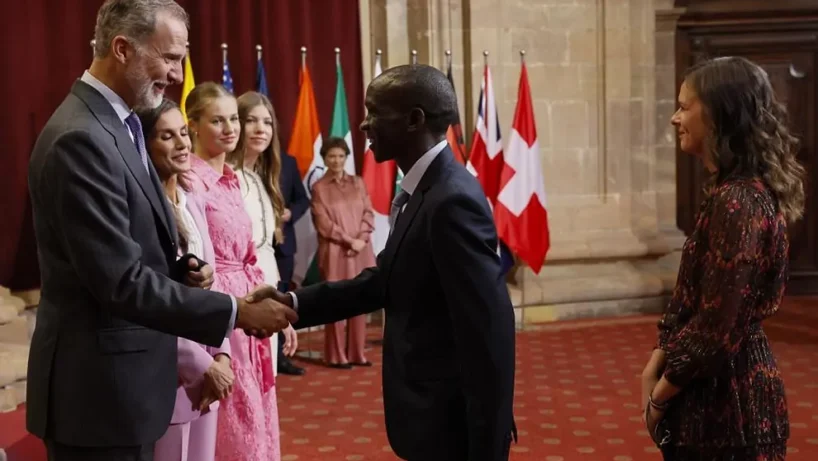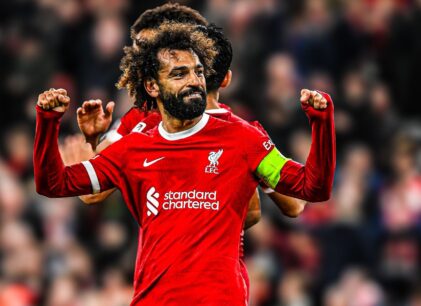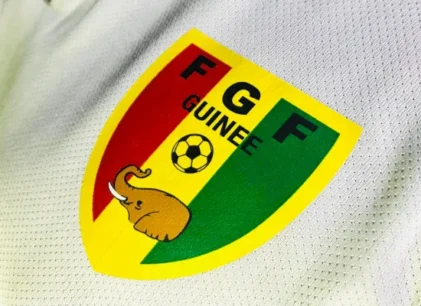Kenyan marathon runner Eliud Kipchoge, 38, has left his mark on his sport with his many victories and his dedication to excellence. But the two-time Olympic medallist also distinguishes himself on the social front. For these reasons, he was officially awarded the “Princess of Asturias” prize in the sport 2023 category (the announcement was made a long time ago). This award recognizes careers which, through the development, support and improvement of sport, and through solidarity and commitment, illustrate today the potential that the practice of sport offers to human beings.
The double Olympic marathon medallist (Rio and Tokyo) nicknamed “The Philosopher”, Eliud Kipchoge, for his thoughtful nature and passion for reading, according to Marca, was chosen by the Princess of Asturias jury for his impact on sport, but also his social impact through his foundation. No doubt his brilliant and inspiring sporting career also played a part in this recognition. Indeed, Kipchoge ran for the simple fact of going to school, and later to help his family by selling the milk he collected from his neighbors. That’s how he came to be spotted. This made him an example of self-sacrifice, winning 4 Olympic medals including 2 gold in the marathon, and numerous victories in the most prestigious marathons. Until recently, he also held the 42 km record.
Kipchoge’s message to the world
The Kenyan gave a speech on the official podium at the ceremony. The recent winner of the Berlin Marathon for the 5th time delivered a philosophical message for a better world, regardless of skin color.For him, the marathon is an allegory for a happy world.“When you run, your origins or skin color don’t matter.In a marathon, we’re all one. They applaud you for the hours of discipline and dedication. We must make our world a running world, because a running world is a happy world and a peaceful world, a united world”, he declared in his speech before receiving the award.
One of the greatest athletes in history gave meaningful messages about surpassing oneself, but also in ecological terms. “Someone who completes a marathon is capable of achieving anything in life. No human being is limited; we only achieve greatness if we don’t set ourselves limits”. He invited us to see the world without limits and start running. Kipchoge explained that every time he wins a race, he plants a tree in Kenya, because “the moment of glory is fleeting, but the tree lasts a lifetime”.
Social work
Eliud Kipchoge is not only a champion on the track, he is also a champion in his work for the well-being of Kenyans. The foundation that bears his name facilitates access to education for children and fights to protect the environment. One of her foundation’s objectives is to create libraries in all public schools in her country, in order to provide “an adequate education for children”.
The Princess of Asturias Award, which has been in existence since 1981, also recognizes excellence in the following 7 categories: arts, social sciences, communication and humanities, concord, international cooperation, scientific and technical research and literature.
🎖️ Eliud Kipchoge, Premio Princesa de Asturias de los Deportes
🏃♂️"Un mundo que corre es un mundo feliz"https://t.co/CYfZiB93QC
— Tiempo de Juego (@tjcope) October 20, 2023
Athletes honoured before him
This is the 11th time the prize has been awarded to athletics: Sebastian Coe (1987), Sergei Bubka (1991), Javier Sotomayor (1993), Hassiba Boulmerka (1995), Carl Lewis (1996), the Spanish marathon team (1997). Hicham El Guerrouj (2004), Yelena Isinbáyeva (2009) and Haile Gebrselassie (2011) and the New York Marathon (2014).
Composition of the 2023 jury: Teresa Perales (president); Theresa Zabell (secretary); Abel Anton; Thérèse Bernadas; Gemma Castaño; Cristina Cubero; Joaquín Folch-Rusiñol; Juan Ignacio Gallardo, director of MARCA, Patricia García; Vicente Jiménez; Feliciano López; Lluís Mascaró; Guadalupe Porras; Julián Redondo and Samuel Sánchez.





